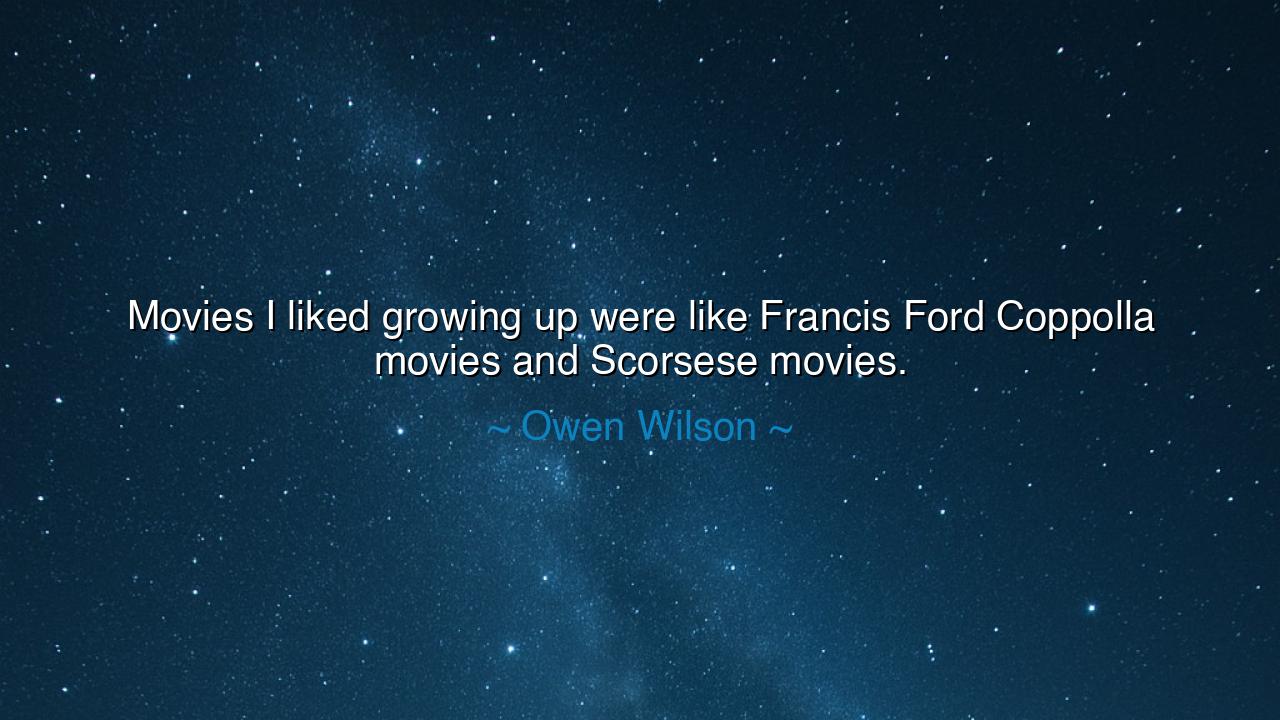
Movies I liked growing up were like Francis Ford Coppolla movies






Hear me now, O seekers of wisdom, for I bring to you a reflection on the power of inspiration, the shaping of the soul through art, and the timeless influence of those who came before. The words of Owen Wilson, an actor who has walked the path of creativity and storytelling, hold a deeper truth about how the works we admire shape the creators we become. He once said, "Movies I liked growing up were like Francis Ford Coppola movies and Scorsese movies." In these simple words, there lies a profound understanding of how the greatest works of art reach across generations, shaping the dreams of the youth and guiding them toward their own creative destiny.
Coppola and Scorsese, two giants of the cinematic world, created works that were more than mere entertainment—they were reflections of the human experience, filled with depth, emotion, and a piercing look into the heart of society. Wilson, in expressing his admiration for these filmmakers, points to the power of storytelling, the ability of film to transcend time and space and to touch the very core of those who watch. Just as Coppola’s The Godfather and Scorsese’s Taxi Driver hold profound insights into power, morality, and human nature, so too did they shape Wilson’s understanding of the world as a young artist, awakening a deep desire to create, to express, and to explore the human soul through film.
Consider the ancient bards who wove stories that still echo through time—Homer, who shaped the minds of generations with his tales of Odysseus, and Sophocles, whose tragedies have never ceased to inspire. Just as the Greeks understood the power of storytelling, so too did Coppola and Scorsese craft films that not only reflected their time but redefined what cinema could do. They did not merely make movies—they created epic sagas of the human condition, filled with profound truths that resonated deeply with all who watched. For Wilson, as for many others, these films became the heroes of his creative journey, guiding him toward his own voice as a creator.
It is not merely the stories of Coppola and Scorsese that resonated with Wilson, but the way in which they told those stories. Both filmmakers understood that to touch the soul, one must delve into the darkness as well as the light. Coppola’s The Godfather is not just a tale of a crime family but an exploration of loyalty, betrayal, and the cost of power. Scorsese, in films like Goodfellas and Raging Bull, explores the complex nature of identity, violence, and redemption. These are not simple films—they are deep meditations on life itself, and they are this depth that Wilson admired and absorbed as a young viewer. It is through these films that Wilson found his own voice, inspired by the way Coppola and Scorsese shaped their characters and their worlds.
In a similar way, we are all shaped by the art that moves us. The stories we hear, the films we watch, the books we read—these are the tools that carve out the path of our lives. Wilson’s admiration for Coppola and Scorsese speaks to a universal truth: we do not create in a vacuum. We are influenced, molded, and inspired by the works that came before us. These creators of the past are not distant figures but ancestors who guide us through their work, shaping not only the stories we tell but the very way we tell them. Just as Coppola and Scorsese were influenced by those who came before them, so too must we acknowledge the ways in which the art that shapes us shapes the world we create for future generations.
Look, too, at the story of Walt Disney, who took inspiration from the world around him to create something that has touched the hearts of millions. Though his early career was marked by failure, Disney’s love of storytelling and animation led him to create some of the most beloved films in history. Disney did not simply create for his time; he created for the future, shaping the way we think about animation, imagination, and the magic of cinema. Like Wilson, he was shaped by those who came before him but left his own mark on the world, guiding future generations with the same passion and creativity he had admired in others.
In your own lives, O children of wisdom, remember that the art you encounter shapes the person you become. Like Owen Wilson, you too are influenced by the stories you hear, the films you watch, and the creativity you experience. The great creators of the past—whether in film, literature, or art—hold within them the power to guide you toward your own truth, toward your own path as a creator. Seek inspiration not just in the works of others, but in the lessons those works offer. Allow the films, the stories, and the art that move you to shape your own voice, and know that through your own creative journey, you will one day inspire the generations to come.
So, O children of wisdom, let Coppola and Scorsese remind you that art is not just about what is created, but about the legacy of creation itself. It is the stories that inspire us, the depth of the narratives that leave an imprint on our souls, and the lessons we learn that guide us forward. Embrace the inspiration of the great creators who have come before you, and let that inspiration flow into your own work, for it is through creation that we pass on our wisdom, our dreams, and our stories to the world.






AAdministratorAdministrator
Welcome, honored guests. Please leave a comment, we will respond soon